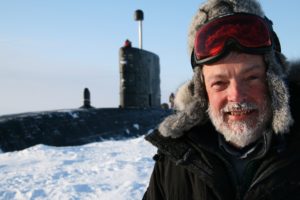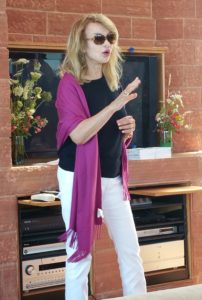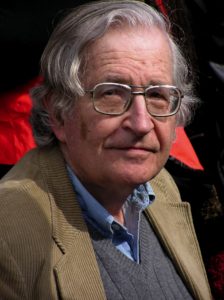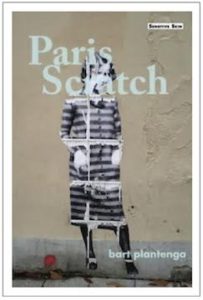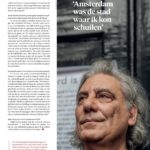Removing Carbon Dioxide From The Air To Fix Climate Change: An Interview With Graciela Chichilnisky And Peter Wadhams
Climate change and global warming, caused by greenhouse gas emissions, pose a grave threat to humanity — even greater perhaps than that of nuclear weapons. Yet, just like with nuclear weapons, political inertia stands on the way of tackling the massive problem of climate change in an effective and meaning way. Moreover, the challenge of averting a climate change catastrophe can be met at the present juncture with the aid of carbon negative technology that can suck CO2 from the atmosphere and thus stabilize and even begin reversing the warming of the planet.
Indeed, in the interview that follows, leading economist and climate change authority Graciela Chichilnisky, author and architect of the Kyoto Protocol Carbon Market and CEO and cofounder of Global Thermostat, and Peter Wadhams, Professor of Ocean Physics at Cambridge University and UK’s most experienced sea ice scientist, highlight the necessity of sucking carbon dioxide from the air as the only way available right now to save the planet from the threat of climate change and global warming.
J. Polychroniou with Marcus Rolle: Climate change poses a massive threat to the world economy, to human civilization and to the planet on the whole, yet little seems to be done by the world community to break cultural and political inertia. What’s your explanation for climate change inertia?
Graciela Chichilnisky: Climate change involves extraordinary and unprecedented risks that people and organizations are ill equipped to deal with. Put simply, most people do not know what can be done about it, and they do not even know how to think about climate change. This paralyzes them from action. In addition, there is an erroneous perception that the economic costs of taking action against climate change are too high making action impossible in economic terms, which is untrue. The global scope and complexity of the issue defies standard knowledge and paralyzes most people, and this couples with economic interests of groups and businesses that are invested in conventional energy sources such as fossil fuels. About 45% of all global emissions come from electricity plants, which are a $55 trillion global infrastructure that is 87% run by fossil fuels.
Exxon Mobil is facing several law suits after allegedly misleading the public about the risks of climate change caused by burning fossil fuels, the source of their revenues, and presenting obstacles for solutions. Dated economic interests couple with denial, ignorance and fear, and cause climate change inertia. Because the issue is complex, even well-meaning people and organizations can be confused or ill informed. For example, the United Nations Framework Convention on Climate Change (UNFCCC), which is the single global organization responsible for preventing climate change, and its Green Climate Fund created recently to make funding available to avert climate change, focus on “adaptation and mitigation” towards climate change, particularly in the developing nations that will suffer the worst damages. This would be a natural reaction to disasters such as earthquakes, droughts or tornados, which are of a smaller magnitude. The situation is quite different with climate change. It is not possible for human societies to adapt or mitigate the global damages caused by catastrophic climate change, and we should be focused on resolving the problem rather than in adapting to it, or mitigating it after the fact. The North and the South poles are melting, raising the world’s oceans ravaging coastal areas around the world and eventually submerging under the swollen seas 43 island nations that make up about 20% of the UN vote. Very little can be done to “adapt and mitigate” the human damages in a nation that is quickly and inexorably submerging under the oceans. There is no way to adapt to the chaos and destruction in large cities like New York as they face several disasters a year of the scope of hurricane Sandy, severing access to electricity and drinking water and to law and order, making transportation and working conditions impossible, with cars and vehicles floating in the flooded streets. Read more
The School Of Life ~ Sociology – Alexis De Tocqueville
Alexis de Tocqueville was a 19th century French aristocrat with some crucial things to tell us about the strengths and weaknesses of that once-new and now widespread political system: democracy. Please subscribe here: http://tinyurl.com/o28mut7
If you like our films take a look at our shop (we ship worldwide): http://www.theschooloflife.com/shop/all/
Noam Chomsky On The Evolution Of Language: A Biolinguistic Perspective
Truth-out.org ~ September 2016. Human language is crucial to the scientific quest to understand what kind of creatures we are and, thus crucial to unlocking the mysteries of human nature.
In the interview that follows, Noam Chomsky, the scholar who single-handedly revolutionized the modern field of linguistics, discusses the evolution of language and lays out the biolinguist perspective — the idea that a human being’s language represents a state of some component of the mind. This is an idea that continues to baffle many non-experts, many of whom have sought to challenge Chomsky’s theory of language without really understanding it.
Journalist and ”radical chic” reactionary writer Tom Wolfe was the latest to do so in his laughable new book, The Kingdom of Speech, which seeks to take down Charles Darwin and Noam Chomsky through sarcastic and ignorant remarks, making vitriolic attacks on their personalities and expressing a deep hatred for the Left. Indeed, this much-publicized book not only displays amazing ignorance about evolution in general and the field of linguistics in particular, but also aims to portray Noam Chomsky as evil — due to his constant and relentless exposure of the crimes of US foreign policy and other challenges to the status quo.
C. J. Polychroniou: Noam, in your recently published book with Robert C. Berwick (Why Only Us: Language and Evolution, MIT Press 2016), you address the question of the evolution of language from the perspective of language as part of the biological world. This was also the theme of your talk at an international physics conference held this month in Italy, as it seems that the scientific community appears to have a deeper appreciation and a more subtle understanding of your theory of language acquisition than most social scientists, who seem to maintain grave reservations about biology and the idea of human nature in general. Indeed, isn’t it the case that the specific ability of our species to acquire any language was a major theme of interest to the modern scientific community from the time of Galileo?
Noam Chomsky: This is quite true. At the outset of the modern scientific revolution, Galileo and the scientist-philosophers of the monastery of Port Royal issued a crucial challenge to those concerned with the nature of human language, a challenge that had only occasionally been recognized until it was taken up in the mid-20th century and became the primary concern of much of the study of language. For short, I’ll refer to it as the Galilean challenge. These great founders of modern science were awed by the fact that language permits us (in their words) to construct “from 25 or 30 sounds an infinite variety of expressions, which although not having any resemblance in themselves to that which passes through our minds, nevertheless do not fail to reveal all of the secrets of the mind, and to make intelligible to others who cannot penetrate into the mind all that we conceive and all of the diverse movements of our souls.”
We can now see that the Galilean challenge requires some qualifications, but it is very real and should, I think, be recognized as one of the deepest insights in the rich history of inquiry into language and mind in the past 2500 years.
The challenge had not been entirely ignored. For Descartes, at about the same time, the human capacity for unbounded and appropriate use of language was a primary basis for his postulation of mind as a new creative principle. In later years, there is occasional recognition that language is a creative activity that involves “infinite use of finite means,” in Wilhelm von Humboldt’s formulation and that it provides “audible signs for thought,” in the words of linguist William Dwight Whitney a century ago. There has also been awareness that these capacities are a species-property, shared by humans and unique to them — the most striking feature of this curious organism and a foundation for its remarkable achievements. But there was never much to say beyond a few phrases.
But why is it that the view of language as a species-specific capacity is not taken up until well into the 20th century?
There is a good reason why the insights languished until mid-20th century: intellectual tools were not available for even formulating the problem in a clear enough way to address it seriously. That changed thanks to the work of Alan Turing and other great mathematicians who established the general theory of computability on a firm basis, showing in particular how a finite object like the brain can generate an infinite variety of expressions. It then became possible, for the first time, to address at least part of the Galilean challenge directly — although, regrettably, the earlier history [for example, the history of Galileo’s and Descartes’ inquiries into the philosophy of language, as well as the Port-Royal Grammar by Antoine Arnauld and Claude Lancelot] was entirely unknown at the time.
With these intellectual tools available, it becomes possible to formulate what we may call the Basic Property of human language: The language faculty provides the means to construct a digitally infinite array of structured expressions, each of which has a semantic interpretation expressing a thought, and each of which can be externalized by means of some sensory modality. The infinite set of semantically interpreted objects constitutes what has sometimes been called a “language of thought”: the system of thoughts that receive linguistic expression and that enter into reflection, inference, planning and other mental processes, and when externalized, can be used for communication and other social interactions. By far, the major use of language is internal — thinking in language. Read more
Towards A New Spur For EU Democracy Building Learn And Engagement ~ Final Report Phase 1
 New forms of Societal and intercultural engagement and volunteering as a New Spur for civic and democratic participation at EU level
New forms of Societal and intercultural engagement and volunteering as a New Spur for civic and democratic participation at EU level
The project was an initiative of Nea Smyrni municipality, a municipality located about 4 km southwest of central Athens, Greece, named so after the city Smyrna (today’s İzmir in Turkey), from where a large number of refugees arrived and settled in the Nea Smyrni area following the 1922 population exchange between Greece and Turkey.
The municipality implemented the project with the support of the “Europe for Citizens” programme of the European Union.
The main goal of “SPUR” program was to highlight and assess both the value of solidarity and volunteering in the current context of economic and humanitarian crisis inside United Europe as well as to improve the conditions for civic and democratic participation of citizens providing them,as a New Spur, New forms of Societal and intercultural engagement for the enhancement of civic and democratic participation at national and European level.
These forms – away from extremist or populist movements and radicalized behaviors and beyond xenophobia, intolerance and any discrimination against the vulnerable or excluded people within EU societies and underprivileged and disadvantaged populations, which often include youngsters and people of non – EU origins :
a) Stabilize the social welfare, health, employment, education, environment, culture, etc. systems, which brutally affected in times of economic recession and poverty,
b) Protect further the fundamental rights, in particular of minorities,
c) Help restore law and civil parity for a decent living,
d) Promote and foster the economy and the development and finally,
e) Consolidate the faith, to the principles and values on which the European ideal is founded, in particular of the different types of Eurosceptics, and put forward the achievements of the United Europe and the cost of no Europe creating a new positive narrative for Europe and Europe integration.
Information about the four (4) non-formal education events:
[Also visit the website of the project “SPUR” http://dnsspur.gr/en for the analytical programmes, videos and photos. Presentations: http://dnsspur.gr/en/presentations/
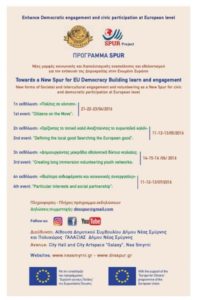 Towards a New Spur for EU Democracy Building learn and engagement.
Towards a New Spur for EU Democracy Building learn and engagement.
New forms of Societal and intercultural engagement and volunteering as a New Spur for civic and democratic participation at EU level was funded with the support of the European Union under the Programme “Europe for Citizens”
Event 1
Participation: The event involved 155 citizens, including 119 participants from the city of Nea Smyrni but also from various areas of the city of Athens, capital of Greece, and its suburbs and municipalities of Athens (Greece), 5 from the Greek entity-partner IMEPO/Greece, 4 participants from the city of Brossac but also from other cities of France (France), 3 participants from the city of Porto de Mós, (Portugal), 8 participants from the city of Mali Lošin but also from other cities of Croatia, (Croatia), 2 participants from the city of Gdynia but also from other cities of Poland, (Poland), 2 participants from the city of Česká Třebová (Czech Republic), 2 participants from the city of Pazardzhik Region (Bulgaria), 1 participant from the city of Comune di Castel Goffredo (Ιτaly), 5 participants from the city of Primaria Municipiului Bucuresti (Romania), 3 participants from the city of Strovolos but also from other cities of Nicosia region (Cyprus), as well as 1 participant from the city of Amsterdam (Nederland)
Location / Dates: The event took place in Nea Smyrni (Greece), from 21/04/2016 to 22/04/2016
Short description: The aim of the event was “Citizens on the Move” for a New Europe with the following Topics for development
• Development of citizens’ understanding of the EU policy making-process, EU history, values and diversity
• Deepening of the discussion on the future of Europe and on what kind of Europe citizens want.
Event 2
Participation: The event involved 151 citizens, including 117 participants from the city of Nea Smyrni but also from various areas of the city of Athens, capital of Greece, and its suburbs and municipalities of Athens (Greece), 5 from the Greek entity-partner IMEPO/Greece, 4 participants from the city of Brossac but also from other cities of France (France), 5 participants from the city of Porto de Mós, (Portugal), 2 participants from the city of Gdynia but also from other cities of Poland, (Poland), 1 participant from the city of Česká Třebová (Czech Republic), 3 participants from the city of Ljubljana (Slovenia),5 participants from the city of Pazardzhik Region (Bulgaria), 2 participants from the city of Comune di Castel Goffredo (Ιτaly), 3
participants from the city of Primaria Municipiului Bucuresti (Romania), 3 participants from the city of Strovolos but also from other cities of Nicosia region (Cyprus), as well as 1 participant from the city of Amsterdam (Nederland)
Location / Dates: The event took place in Nea Smyrni (Greece), from 11/05/2016 to 13/05/2016
Short description: The aim of the event was “Defining the local good – Searching the European good” with the following Topics for development
• Promoting innovative opportunities of democratic and civic participation
• Reinforcement of already existing instruments for participation in civic dialogue at local and EU level.
Event 3
Participation: The event involved 152 citizens, including 122 participants from the city of Nea Smyrni but also from various areas of the city of Athens, capital of Greece, and its suburbs and municipalities of Athens (Greece), 5 from the Greek entity-partner IMEPO/Greece, 2 participants from the city of Porto de Mós, (Portugal), 4 participants from the city of Gdynia but also from other cities of Poland, (Poland), 1 participant from the city of Česká Třebová (Czech Republic), 1 participant from the city of Ljubljana (Slovenia) ,5 participants from the city of Pazardzhik Region (Bulgaria), 1 participant from the city of Comune di Castel Goffredo (Ιτaly), 3 participants from the city of Primaria Municipiului Bucuresti (Romania), 3 participants from the city of Strovolos but also from other cities of Nicosia region (Cyprus), 4 participants from the city of London (United Kingdom) as well as 1 participant from the city of Amsterdam (Nederland)
Location / Dates: The event took place in Nea Smyrni (Greece), from 14/06/2016 to 16/06/2016
Short description: The aim of the event was “Creating long immersion volunteering youth networks” with the following Topics for development
• Local community-minded young citizens as educated and experienced in dealing of the European sides of social issues, empowered to make more informed decisions and take meaningful action as members of the European society who weigh in on issues that impact the democracy in EU
Event 4
Participation: The event involved 179 citizens, including 145 participants from the city of Nea Smyrni but also from various areas of the city of Athens, capital of Greece, and its suburbs and municipalities of Athens (Greece), 5 from the Greek entity-partner IMEPO/Greece, 2 participants from the city of Brossac but also from other cities of France (France), 5 participants from the city of Dublin (Ireland), 5 participants from the city of Mali Lošin but also from other cities of Croatia, (Croatia), 4 participants from the city of Gdynia but also from other cities of Poland, (Poland), 1 participant from the city of Česká Třebová (Czech Republic), 3 participants from the city of Ljubljana (Slovenia), 1 participant from the city of Comune di Castel Goffredo
(Ιtaly), 3 participants from the city of Strovolos but also from other cities of Nicosia region (Cyprus), 4 participants from the city of London (United Kingdom) as well as 1 participant from the city of Amsterdam (Nederland)
Location / Dates: The event took place in Nea Smyrni (Greece), from 11/07/2016 to 12/07/2016
Short description: The aim of the event was “Learning critical EU social and political issues” – “Particular Interests and Social Partnership” with the following Topics for development
• The Disability, Ecology and Migration Strategies based on societal and intercultural engagement and volunteering as a new spur for EU Democracy
• How people with particular interests harmed by the EU could be equal active citizens in Union
• The accessible pathways for Eurosceptic individuals to ensure an inclusive and participative democratic life at EU level
• Innovative models of cooperation between state, governmental and national institutions, the economic sector and voluntary unions of citizens
Oxford Union ~ Yanis Varoufakis – Full Address & Q&A
Yanis Varoufakis is an academic economist who was a member of the Greek parliament between January and September 2015. He represented the ruling Syriza party and held the position of Minister of Finance for seven months.
See: https://yanisvaroufakis.eu/
About the Oxford Union Society: The Oxford Union is the world’s most prestigious debating society, with an unparalleled reputation for bringing international guests and speakers to Oxford. Since 1823, the Union has been promoting debate and discussion not just in Oxford University, but across the globe.
See: http://www.oxford-union.org/
PARIS SCRATCH ~ bart plantenga [RQ’s First Advertorial]
advertorial /ˌadvəːˈtɔːrɪəl/ – noun: advertorial; plural noun: advertorials – a newspaper or magazine advertisement giving information about a product in the style of an editorial or objective journalistic article.
The complete PARIS SCRATCH is now available from Sensitive Skin.
The skill and intensity with which plantenga chronicles these sorties into life lived at the edge should ensure his place in the next pantheon of great bohemian saints and sinners.
Kevin Riordan, Chicago Reader, Coal Hill Review
I’m really excited to announce this because PARIS SCRATCH is a magical book containing 365 [1 per day] not quite poems; not quite journal entries – “zen blink meta-factual snapshots of everyday Paris life” where the author lived for some 3 years, deejayed, worked everyday jobs and wrote for outlets such as Paris Passion, Paris Free Voice, The Frank, etc.
“A marvelous book – imagine Baudelaire taking a camera & throwing out his pen in a rebellious manner then taking snapshots of everything that comes his way…”
• Nina Zivancevic, author of Living on Air & Death of NYC
bart plantenga spent much time roaming the Paris streets, but instead of documenting with a camera he chose a pen instead, scribbling observations while walking in ragged notepads in a handwriting not quite illegible.
I really like the way he describes it: “Wandering the streets & writing simultaneously fuses two key creative acts – if worn shoe heels & barely legible scribbles can be considered manifestations of creativity. When you live in a city long enough, you wake up one day & what was fascinating & compelling yesterday suddenly becomes the background for routine. You may not even notice you’ve stopped looking, curiosity curbed, eyes down to the ground & fixed on getting from point A to point B. To reinvent my relation to my surroundings – first Paris & later NYC – I came up with the Unloaded Camera Snapshots series, a simple exercise to document the ‘snapshots’ of everyday life. They served as attempts to re-pollinate existence with the fecund, oft-neglected details of the everyday, la vie quotidienne.
plantenga was born in Amsterdam, grew up on the American East Coast, lived all over America, moved to Paris and eventually back to his native Amsterdam. He is the author of the much-excerpted novel Beer Mystic, which Luc Sante described as: “Top-fermented, with a good nose, an acrid middle, a dry finish – bubbly and acidulous in reserved measure – and with ambient yeast peculiar to the Lower East Side, the kind that turns concrete to dust. Plantenga is a poet and a prankster as well as a distinguished bathtub brewer. He deserves immediate investigation.”
His short story collection Wiggling Wishbone and novella Spermatagonia: The Isle of Man earned him positive reviews and favorable comparisons to JG Ballard, Philip K. Dick, William Gibson. Andrei Codrescu, National Public Radio described his writing as “frightfully intelligent.”
His books on yodeling YODEL-AY-EE-OOOO: The Secret History of Yodeling Around the World [Routledge, 2004] Yodel in HiFi: From Kitsch Folk to Contemporary Electronica plus the CD compilation Rough Guide to Yodel received worldwide attention: NPR, BBC, Al-Jazeera, ABC television, WNYC, WFMU, Rolling Stone, Vanity Fair,Washington Post, Entertainment Weekly, UTNE Reader, The Wire, Village Voice, London Review. New York Times Magazine featured Yodel-Ay-Ee-Oooo in its “6th Annual Year of Ideas”. The books have created the misunderstanding that he is one of the world’s foremost yodel experts.
His work has appeared in many academic journals, popular magazines, literary journals: [Ambit, Evergreen Review, Vokno, Exquisite Corpse, Downtown, Urban Grafitti, Fringecore, Sandbox, Carolina Quarterly, Mississippi Review] and mainstream media: The Guardian, Times of London, American Heritage, American Book Review, Actuel, New Hampshire, Michigan Today, Brooklyn Rail, KLM Holland Herald, American Lawyer…
He also writes about refugees for both Vox Populi & Truthdig.
He has lectured/read at the Library of Congress, Rotterdam Opera Days, Sound Escape Conference [Toronto], NYU Fales Library, The Brooklyn Bridge Reading, & countless venues around the world.
Anthologies: Nation-KGB Nonfiction Reader; Waiting for a Train: Jimmie Rodgers’s America; Up Is Up, But So Is Down: New York’s Downtown Literary Scene; Reggae, Rasta, Revolution: Jamaican Music from Ska to Dub [Simon & Schuster]; Sonic Geography Imagined and Remembered; Semiotext(e) SF, Crimes of the Beat, Radiotext(e),Noirotica #3, Fiction International, Best American Erotica 1994 [Simon & Schuster].
He is one of the co-founders of the NYC-based Unbearables writing group, which has produced numerous anthologies and countless thematic lit events since their founding in the later 1980s.
He is also a DJ-radiomaker and has produced guest radio shows for the BBC and VPRO (NL), has appeared on a dozen NPR radio shows, as well as NBC and ABC TV plus public radio in the Netherlands, France and Switzerland. He has produced his radio show Wreck This Mess since 1986 in NYC (WFMU), Paris (Radio Libertaire) & Amsterdam (Radio 100/Radio Patapoe/Mixcloud) where he now lives.
“Paris Scratch” is a beautiful, picturesque read that I’ve been savoring slowly for a couple of weeks now. In the tradition of writers like Georges Perec, Roland Barthes, Patrick Modiano, Jean-Paul Clebert, with echoes of Queneau’s “Exercises in Style,” Plantenga captures a Paris that finds beauty and wonder in simple exchanges between prostitutes and shopkeepers, children, workers, and random passersby. … The synthesis of poetry and prose, the homage to the visual image, and the recognition of the sublime beauty of the unspectacular, make this a compelling and immensely satisfying read. Sip this book like cognac.
Alfred Vitale, author, academic, editor of RANT
The companion to Paris Scratch, NY SIN PHONEY IN FACE FLAT MINOR (Sensitive Skin) documents New York using the same tactics and will appear in November 2016.
Please let me know if you are interested. Thanks so much,
Blandine Broche
* For free pdf or paper reviewer’s copy: contact us & we will forward your request to the publisher.
